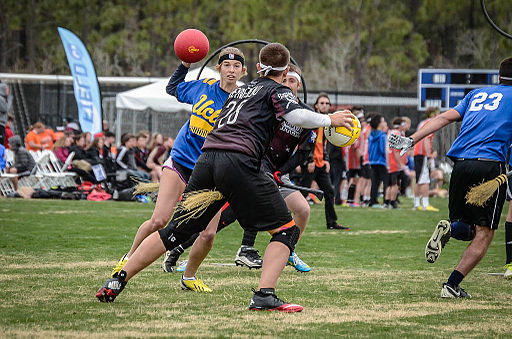It being the festive season and goodwill abounding, I have decided to skate out on thin ice and to raise the alarming news that the powers that be in the sport of Quidditch have apparently decided to consider re-naming their game in an attempt to distance themselves from what they consider to be transphobic utterances by JK Rowling, the author of the Harry Potter books.
Quidditch, for the small minority who need to be told, is an imaginary game played in Hogwarts school by its pupils – young magicians – and features players swooping about on magic broomsticks and scoring points by derring-do – a little like aerial polo players. Rowling has elaborated on Quidditch in a separate book entitled Quidditch Through The Ages.
Apparently, youngish adults across the world – mostly college students – have adapted the imaginary game into a faintly ridiculous form in which they play an earthbound version on a pitch and must at all times carry a broomstick between their legs as they canter about competing for points. This terrestrial form of Quidditch is sometimes known as Muggle Quidditch – muggles being Rowlings term for humans who lack magical powers.
Quidditch players – like their imaginary Rowling characters – play a mixed game, open to both genders. A bit like tag rugby games, I suppose. However, they have a “Four Maximum Rule” which prohibits a team from having more than four players of either gender (excluding the “seeker”) on the pitch at any time. This rule is complicated by other rules that entitle a player to choose either gender or none. The Quidditch sport compliments itself for its gender inclusivity.
So far so good.
But then Jo – as JK Rowlings is known to her friends went and spoiled it all. She queried online the use of the phrase “people who menstruate” as a woke term for biological women of a certain age.
Suddenly, she was engulfed in torrid controversy. She stood what she considered to be her ground and stated:
“If sex isn’t real, there’s no same-sex attraction. If sex isn’t real, the lived reality of women globally is erased. I know and love trans people, but erasing the concept of sex removes the ability of many to meaningfully discuss their lives. The idea that women like me, who’ve been empathetic to trans people for decades, feeling kinship because they’re vulnerable in the same way as women – i.e. to male violence – ‘hate’ trans people because they think sex is real and has lived consequences – is a nonsense”.
Many people might have thought that this clearly and adequately explained her views in inoffensive terms and that that might have been the end of the matter. Nobody had to agree with her after all.
But it wasn’t the end of the matter. The Maya Forstater case in which Ms. Forstater successfully appealed a decision of a tribunal employment judge for holding that her dismissal for a series of tweets questioning government plans (which were not proceeded with) to let people declare their own gender was unacceptable, became another battleground for JK Rowling and her critics.
The tribunal judge had held that Ms. Forstater was ‘absolutist’ in her view and did not have the right to ignore the rights of transgender persons and the ‘enormous pain that can be caused by misgendering’. In the High Court, however, it was held that Ms. Forstater’s views ‘did not seek to destroy the rights of trans persons’.
Rowling now reiterated her position. One of her online critics tweeted as follows: ‘Do NOT read #JK Rowling’s transphobic manifesto. I already did it for you. Every line is misinformation, fearmongering, misgendering, othering, ignorance, far-right language/dog whistles, and pure hate. It’s not just ugly. This is HATE. Don’t ingest this BS. I beg you.”
Last year the conservative newspaper Catholic Voice was warning Irish parents against the malign influence anti-religious of Harry Potter books. This year, woke activists are shunning Rowling because she has stood by her own views on the reality of gender and on the limits of concepts such as self-identification in gender for many areas of life, including language and sport.
The faintly ridiculous decision of the international Quidditch community to rename their gravity-bound broomstick sport in order to demonstrate gender inclusivity is but another instance of the growth of caustic intolerance and cancellation in our social and political debate.
Many people are empathetic to their fellow citizens whose lives are deeply affected by transgender and gender fluidity issues. But should those who consider themselves to be victims of social indifference or discrimination also have the sole right to proscribe language in which other kind-hearted citizens carry on conventional life as offensive or unlawful?
There is, after all, a large difference between giving offence and taking offence. Free speech is important for us all – not just for those who would decide the rights of others while bestride their broomsticks.

